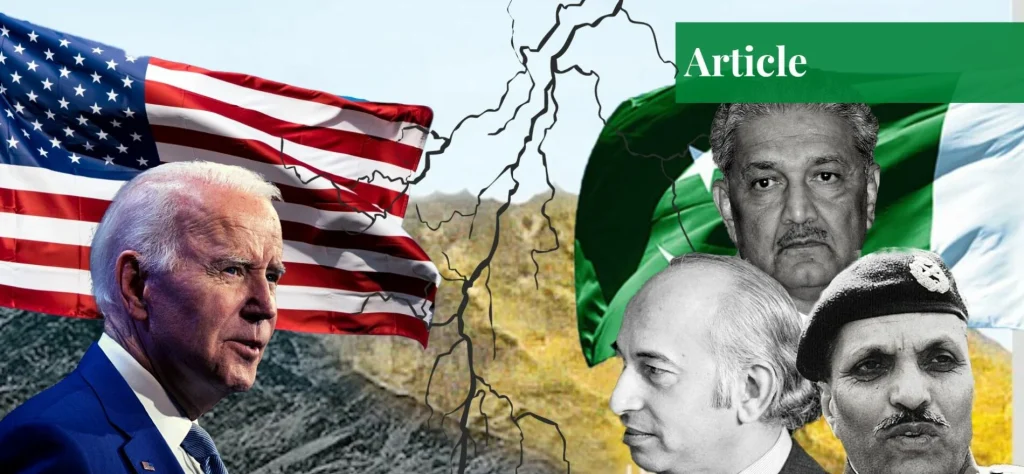A Closer Look at Sanctions the US Imposes Against Pakistan’s Nuclear Program
Pakistan and the US have traditionally had a complicated relationship characterized by both collaboration and confrontation. The two countries have seen shifting fortunes, going from being called “a global migraine” to “the best ally” during the invasion of Afghanistan in 1979. Pakistan’s nuclear program has been the one subject that has damaged their alliance the most over time. The world is paying more attention to this problem as the US recently placed penalties on Chinese businesses that are allegedly responsible for providing equipment for Pakistan’s ballistic missile systems.

US Sanctions on the Nuclear Program of Pakistan:
The most recent restrictions are aimed at Chinese businesses that supply motors to Pakistan’s Shaheen-3 and Ababeel missile systems. The US State Department claims that these actions are classified as “proliferation” and that they will be punished severely. Pakistan’s foreign office has responded by requesting proof for these assertions. Since 2021, the US has imposed sanctions on Chinese and Pakistani organizations six times. Pakistan maintains its commitment to nuclear development in spite of these obstacles, citing security considerations.
Pakistan’s Nuclear Program: History and Rationale:
Under Prime Minister Zulfiqar Ali Bhutto, Pakistan started its nuclear adventure after Dhaka fell in 1971. Bhutto urged the Pakistan Atomic Energy Commission (PAEC) to pursue nuclear technology as a result of the painful division of East Pakistan and India’s developing nuclear capabilities. Pakistan’s preparations were further pushed in 1974 by India’s nuclear tests. Under Dr. Abdul Qadeer Khan, Pakistan turned its attention from plutonium to uranium enrichment as a result of the US imposing economic sanctions.
Following India’s nuclear tests in 1998, Pakistan produced its first nuclear weapons and carried out five tests in the Ras Koh Hills. The world was taken aback by this action, but for Pakistan it was a question of survival—especially against its longtime foe, India.
Pakistan’s Nuclear Program: An Important Strategic Role:
Pakistan’s defense strategy has traditionally relied heavily on geography. Pakistan is surrounded by Afghanistan to the west and India to the east, thus it cannot afford to stop working on its nuclear program. The creation of nuclear weapons deters external threats, especially those coming from India. Pakistan’s dedication to keeping a potent nuclear arsenal is further fueled by the country’s persistent rivalry and regional issues like the Israel-Palestine conflict.
Pakistan maintains its nuclear program in defiance of international sanctions, citing the need to protect its sovereignty over the proliferation of nuclear weapons and the concept of minimum credible deterrence (MCD).
US-China Competition and Pakistan’s Position:
Although Pakistan is the target of US sanctions, many observers think that the US-China competition is the true motivation. The US wants to reduce China’s influence in South Asia, therefore it has sanctioned Chinese corporations that donate to Pakistan’s nuclear program. US hegemony is threatened by China’s rising economic and military might, and sanctions are one tactic used to lessen China’s influence in the area.
Pakistan’s Nuclear Weapons: An Assumed Danger to Israel:
Some strategists believe that Israel, a strong US ally, might be threatened by Pakistan’s nuclear development. Washington is concerned about the procurement of long-range ballistic missiles that can reach Israel. Pakistan, on the other hand, claims that its nuclear program is just for defense and is not directed against any one nation.
Pakistan’s Nuclear Program’s Future in the Face of Shifting Global Dynamics:
Pakistan has reduced its reliance on the US and fostered new allies by shifting its foreign policy focus from geo-strategy to geo-economics in recent years. Pakistan is now more confident to proceed with its nuclear development in spite of the sanctions. However, Pakistan has to support economic development and sustain strong civil-military ties in order to prosper in this changing geopolitical environment. A moderate administration that prioritizes internal stability and diplomacy might assist Pakistan in striking a balance between its defense requirements and its economic growth.
In summary:
Pakistan’s geopolitical and security problems are closely linked to its nuclear program. Pakistan’s strategic interests stemming from its geographic vulnerabilities will probably ensure that its nuclear aspirations remain intact, even in the face of more pressure from the US sanctions. In order to maintain its standing on the international scene, Pakistan will have to deal with both internal problems like economic instability and external obstacles like sanctions in the future.
Pakistan can protect its sovereignty and reduce the dangers associated with sanctions and geopolitical tensions by tackling both global issues and internal growth.




